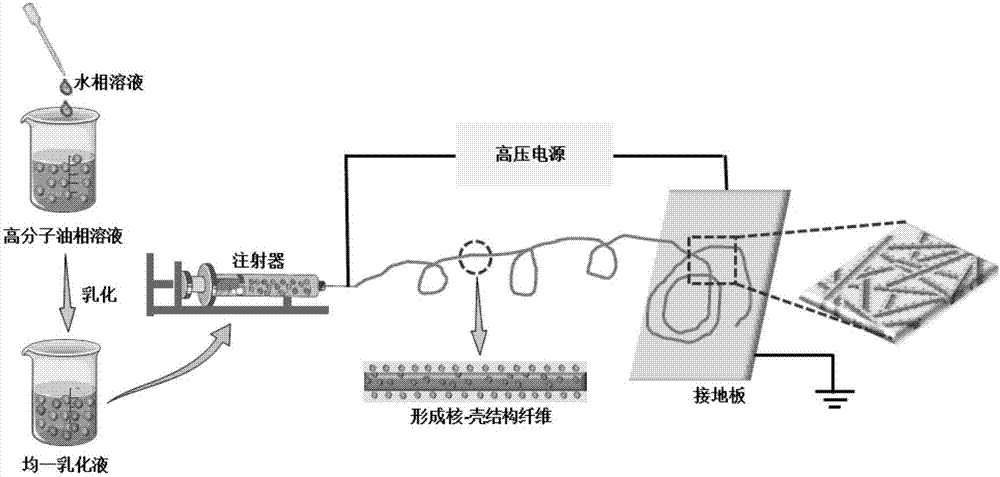Postoperative adhesion-resisting polymer thin film and preparation method thereof
A polymer film and anti-adhesion technology, applied in the field of medical supplies, can solve the problems of difficulty in achieving affinity, poor flexibility and impact resistance, and low purity
- Summary
- Abstract
- Description
- Claims
- Application Information
AI Technical Summary
Problems solved by technology
Method used
Image
Examples
preparation example Construction
[0030] The embodiment of the present invention discloses a preparation method of postoperative anti-adhesion polymer film, comprising the following steps:
[0031] A), mixing biodegradable polymer materials, emulsifiers and organic solvents to obtain a polymer solution; mixing dextran with water to obtain an aqueous phase solution;
[0032] B), adding the aqueous phase solution into the polymer solution, after mixing and emulsifying, a homogeneous emulsion is obtained;
[0033] C), performing electrospinning on the homogeneous emulsion to obtain an electrospun fiber membrane;
[0034] D), after drying the electrospun fiber membrane, carry out ultraviolet ozone treatment to obtain postoperative anti-adhesion polymer film.
[0035] In the present invention, a biodegradable anti-adhesion film for medical surgery is prepared by using the electrospinning technology with simple process, no pollution in the production process, and energy-saving and high-efficiency. The anti-adhesion...
Embodiment 1
[0045] (1) Preparation of organic phase solution: polyethylene glycol / poly(lactic acid-glycolic acid) (viscosity average molecular weight 100,000) was dissolved in chloroform to prepare a polymer solution with a concentration of 6% (by mass fraction) , adding emulsifier benzyltriethylammonium chloride accounting for 5% (by mass fraction) of polyethylene glycol / poly(lactic acid-glycolic acid) in the above system, magnetically stirred for 5 hours to obtain a uniform organic phase solution ;
[0046] (2) Configuration of aqueous phase solution: Dissolve dextran with a molecular weight of 100,000 in secondary water, configure it into a polymer solution with a concentration of 5% (by mass fraction), and vortex for 3 minutes to obtain a uniform water solution. phase solution;
[0047] (3) Emulsion configuration: drip the aqueous phase solution into the organic phase solution drop by drop, set the number of revolutions of the high-speed shear to be 4000 rpm, mix and emulsify to obta...
Embodiment 2
[0052] (1) Preparation of organic phase solution: polyethylene glycol / poly(lactic acid-glycolic acid) (viscosity average molecular weight 100,000) was dissolved in chloroform to prepare a polymer solution with a concentration of 6% (by mass fraction) , adding emulsifier benzyltriethylammonium chloride accounting for 5% (by mass fraction) of polyethylene glycol / poly(lactic acid-glycolic acid) in the above system, magnetically stirred for 5 hours to obtain a uniform organic phase solution ;
[0053] (2) Configuration of aqueous phase solution: Dissolve dextran with a molecular weight of 100,000 in secondary water, configure it into a polymer solution with a concentration of 5% (by mass fraction), and vortex for 3 minutes to obtain a uniform water solution. phase solution;
[0054] (3) Emulsion configuration: drip the aqueous phase solution into the organic phase solution drop by drop, set the number of revolutions of the high-speed shear to 4000 rpm, mix and emulsify to obtain ...
PUM
| Property | Measurement | Unit |
|---|---|---|
| thickness | aaaaa | aaaaa |
Abstract
Description
Claims
Application Information
 Login to View More
Login to View More - R&D
- Intellectual Property
- Life Sciences
- Materials
- Tech Scout
- Unparalleled Data Quality
- Higher Quality Content
- 60% Fewer Hallucinations
Browse by: Latest US Patents, China's latest patents, Technical Efficacy Thesaurus, Application Domain, Technology Topic, Popular Technical Reports.
© 2025 PatSnap. All rights reserved.Legal|Privacy policy|Modern Slavery Act Transparency Statement|Sitemap|About US| Contact US: help@patsnap.com



